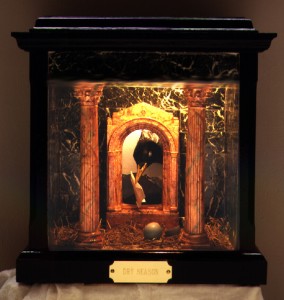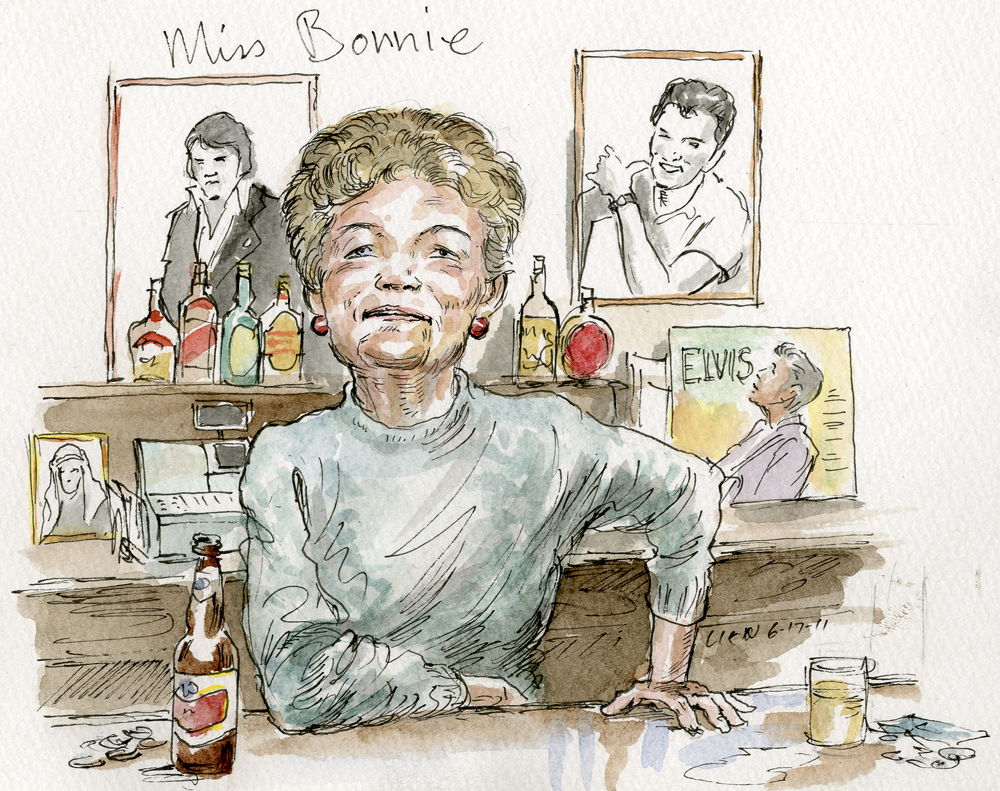The Overseas Alice
“Oh sea . . . I am lonely. I am strange and far, like you.”
– Thomas Wolfe
THE THIRD
In the summer of 1995 – as a 23-year-old third mate not long out of King’s Point — I landed in a Baltimore shipyard on a decrepit tanker called the Overseas Alice. The Alice would be broken up at the same Sparrows Point yard from which she’d been launched during the height of the Vietnam War.
 I hit shore in a dress shirt, sport coat and jeans and came back wrapped in a sheet.
I hit shore in a dress shirt, sport coat and jeans and came back wrapped in a sheet.
I refused to be helped up the gangway, electing instead to crawl on all fours with the sheet draped over my bare haunches. Much of what I’m telling you was told to me by others, including the cop who brought me back to the pier. He said his father had been a seaman and, as such, he had a soft spot for drunks. I thought the comment uncalled for.
The last thing I remember with any clarity is standing before a wall of glass dioramas in an East Baltimore dive called Miss Bonnie’s, a tavern the wiper recommended as a “place where things happen.”
The lowest station in the engine room, wiper is one of the few jobs left in the world with a title that succinctly and completely defines the work performed. The one on the Alice was from Baltimore, said he’d grown up on the streets near Bonnie’s and hated the city so much that he signed off the ship before we reached the Chesapeake.
The dioramas were excellent – museum-quality, partly translucent and as good as anything I’d seen in London or Paris. They remain the most eccentric embellishment of any bar I’ve been in, the scenes unorthodox for the genre, at once commonplace and strange.
A long row of orange-brick houses with a tiny, folded newspaper on each marble stoop but no one on the street.
A distant clock looming over the houses.
The interior of Bonnie’s — wheels within wheels — down to the dust on the bottles and a teenager playing an upright piano in a corner with “Cherry” hand-stitched across his denim jacket.
When you played certain songs on the jukebox, Cherry’s hands moved over the keys.
And a heavy-set young man with a raised baton who resembled Elvis Presley leading a marching band toward the horizon.
Truly magnificent work — stunning — but no signage, no explanation.
“Speaks for itself,” said the snotty barmaid when I ordered another Scotch and soda. “What you see is what you get.”
If the eye believes it, then it is real.
Three feet wide.
Two and a half feet deep.
Two feet high.
If the eye believes it, then it is real.
And everyone sees what they want.
MISS BONNIE
I remember when the first box was drying in the wall – fresh spackle, nobody uses real plaster anymore.
[When we were kids, anyone we couldn’t ditch on the playground was “a goddamn stick’n’ plaster.”]
I pressed my hand into the goo. Left my palm print to dry and wiped my hand on my housecoat, up in the middle of the night because I couldn’t wait ’til the morning to see what it looked like.
Then I ran my finger over three moon-shaped doorbells – shiny and brown, old plastic, I think they came from those houses they tore down on Madeira Street – next to the box.
I pushed it and the box glowed like a star.
It’s still glowing right now on a slow Wednesday night after a dead Wednesday afternoon and I’m okay with being alone; glowing next to a new box that just went into the wall, something I can just sit and admire in peace.
Seventy-six trombones marching up Broadway, from the tugboats to Hopkins.
Fabulous: 76 little soldiers playing 76 trombones made out of kiddie clay and gold foil.
It went into the wall like it was tilted up to the sky and you looked from behind as they marched toward the horizon, my boy way out in front in one of them Buckingham Palace hats.
[They say the real ones are made out of bear fur but this one was made from the hair of a black dog we feed in the alley.]
A right slow Wednesday until that too-big-for-his-britches sailor boy showed up with half-a-load on and a cab full of goofs he picked up between the shipyard and here.
Mister Deck Officer Big Shot.
Well smell me.
Somebody’d given me that jug of highfalutin Scotch one Christmas and it sat on the shelf for years before pretty boy waltzed in. It was empty by the time he left with one of the neighborhood whores.
I don’t like to call the cops on anybody. Sometimes you have to do it, a lot of times you have to. But I never liked it when it was done to me and I don’t like doing it to somebody else. With the local drunks you just throw their ass out and the next day they come in with a ham sandwich peace offering and all is forgiven. But this guy wasn’t going anywhere until I picked up the phone.
On the way out, he grabs a purse from one of my regulars and roots around until he finds lipstick. The regular is cussing him out and he smacking him on the head as he stumbles up to the boxes and right across the new one smears: “Alison loves Alice …”
THE THIEF
Even by seafaring standards, the third mate was a drunk.
Every time he went down the gangway, I’d go through his personal belongings. He’d come back blind and never the wiser.
 I sailed on the Alice as a houseboy in the steward department. The proper name for the work I did is BR for bedroom. Each day, I went into the officers’ rooms to square things away.
I sailed on the Alice as a houseboy in the steward department. The proper name for the work I did is BR for bedroom. Each day, I went into the officers’ rooms to square things away.
I was a teenager and wanted to be a writer, my head filled with the nonsense of a teenager who spent more time getting high with the wiper, an old dude who’d seen Zeppelin and Zappa back in the day, than writing.
My duties were simple: make coffee for the captain, mop the decks, toss out the fruit and milk and anything else that had gone bad in the pantry before stocking it with fresh stores and then start in on the rooms.
I scrubbed their toilets, emptied the trash, vacuumed and made the beds, a drugstore notebook in my pocket to scribble ideas as I worked. Each evening — catching a buzz with the wiper on the fantail, hoping to see the elusive “green flash” – I’d try out my unwritten stories out on him.
He’d take a deep hit of the reefer — always mine, if I didn’t have any we didn’t get high — scratch his belly and say, “Yeah kid, but what happens?”
We had a layover in Galveston before shoving off for Baltimore, where the Alice would be finished with engines for good and the wiper promised to take me to Poe’s grave.
In Texas, the third mate traded shifts to have the weekend off. His wife flew in from Boston and left her luggage in his cabin as they went in search of the best Galveston has to offer.
I was on galley duty that afternoon. While scrubbing pots big enough to make ox-tail stew for 50 — dirt and grease and soap scum up and down my whites – I watched the mate and his wife skip down the swinging gangway.
By then, I’d had a daily relationship with her for a month, face-to-face in an expensive frame as I made her husband’s bed.
Attractive and intelligent, chin resting on her hands – wedding band on the left, signet on the right – she was clear-eyed and seemed secure in her smile. The portrait sat on top of blue prints for a house being built somewhere on the coast of Maine.
By the time we’d left Corpus Christi for New Orleans, I was talking to her.
“Good morning.”
“How are you today?”
“Gee you look nice.”
“Gotta go . . . bye.”
One night, more stoned than usual and missing my friends back home, I stupidly confessed to the wiper.
“Throw a bucket of seawater on her,” he said. “See how good she looks then . . .”
After watching Mr. Currier & Mrs. Ives get into a cab, I used a passkey – camouflaged by my bucket and mop – and eased inside.
Open on a bed I’d made a hundred times was one of those round Patty Duke suitcases — hard plastic and baby blue, a big, floral “A” stenciled beneath the handle. Very cool, not the kind of luggage I’d have guessed the woman in the photo would own.
On top were a few t-shirts from Fenway Park and marathons I assumed she’d run; small-cupped bras and panties in different colors. It all smelled good. Fresh. Beneath the underwear a book of poems – “Second April” — and hidden below that, a notebook marked “Story Ideas” in handwriting that reminded me of recipes on index cards.
My love was a compatriot.
I folded the notebook in half – breaking the spine – and shoved it down the front of my pants.
“Sorry,” I said, taking a last look before packing my sea bag and going to see the captain to get my pay and sign discharge papers.

Rafael Alvarez has lived in Baltimore his entire life except for a brief and cautionary exile in Hollywood. A former City Desk rewrite man for the Baltimore Sun, Alvarez has published books of fiction, memoir and very provincial history. Best known works include “The Fountain of Highlandtown” and the on-going “Orlo & Leini” stories, each detailing life in Crabtown, USA. Alvarez also worked as a reporter for the Baltimore Sun prior to starting a career in television. He has worked as a writer and story editor on the Home Box Office drama series The Wire and a writer and producer on the crime dramas Life and The Black Donnellys. He has written several books including a guide to The Wire, a non-fiction guide to the archdiocese in Baltimore, a short-fiction anthology and two collections of his journalism. He can be reached via [email protected] or [email protected].

